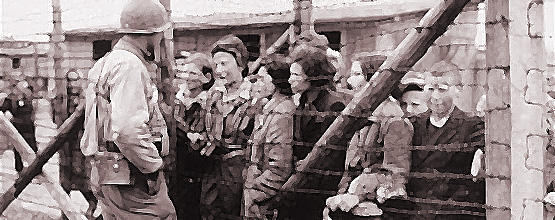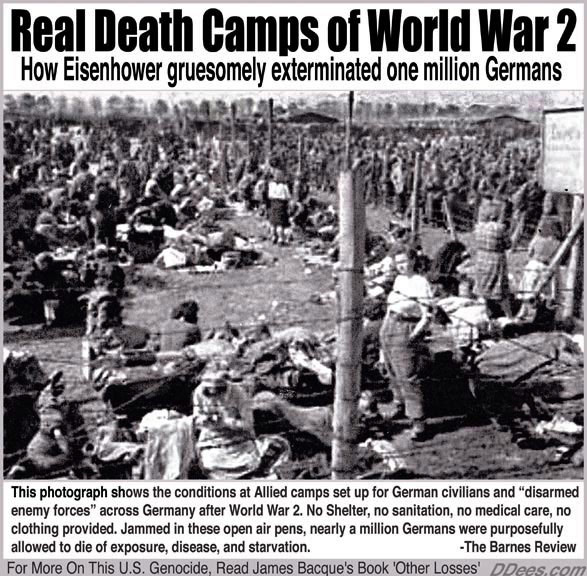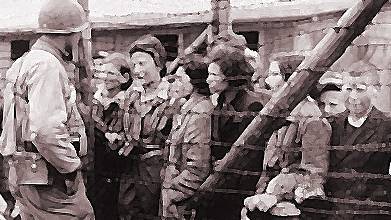In ‘Eisenhower’s Death Camps’: A U.S. Prison Guard Remembers
Source: truthstreammedia.com

They never taught this in history class…
In October 1944, at age eighteen, I was drafted into the U.S. army. Largely because of the “Battle of the Bulge,” my training was cut short, my furlough was halved, and I was sent overseas immediately. Upon arrival in Le Havre, France, we were quickly loaded into box cars and shipped to the front. When we got there, I was suffering increasingly severe symptoms of mononucleosis, and was sent to a hospital in Belgium. Since mononucleosis was then known as the “kissing disease,” I mailed a letter of thanks to my girlfriend.
By the time I left the hospital, the outfit I had trained with in Spartanburg, South Carolina, was deep inside Germany, so, despite my protests, I was placed in a “repo depot” (replacement depot). I lost interest in the units to which I was assigned, and don’t recall all of them: non-combat units were ridiculed at that time. My separation qualification record states I was mostly with Company C, 14th Infantry Regiment, during my seventeen-month stay in Germany, but I remember being transferred to other outfits also.
In late March or early April 1945, I was sent to guard a POW camp near Andernach along the Rhine. I had four years of high school German, so I was able to talk to the prisoners, although this was forbidden. Gradually, however, I was used as an interpreter and asked to ferret out members of the S.S. (I found none.)
In Andernach about 50,000 prisoners of all ages were held in an open field surrounded by barbed wire. The women were kept in a separate enclosure that I did not see until later. The men I guarded had no shelter and no blankets. Many had no coats. They slept in the mud, wet and cold, with inadequate slit trenches for excrement. It was a cold, wet spring, and their misery from exposure alone was evident.
Even more shocking was to see the prisoners throwing grass and weeds into a tin can containing a thin soup. They told me they did this to help ease their hunger pains. Quickly they grew emaciated. Dysentery raged, and soon they were sleeping in their own excrement, too weak and crowded to reach the slit trenches. Many were begging for food, sickening and dying before our eyes. We had ample food and supplies, but did nothing to help them, including no medical assistance.
Outraged, I protested to my officers and was met with hostility or bland indifference. When pressed, they explained they were under strict orders from “higher up.” No officer would dare do this to 50,000 men if he felt that it was “out of line,” leaving him open to charges. Realizing my protests were useless, I asked a friend working in the kitchen if he could slip me some extra food for the prisoners. He too said they were under strict orders to severely ration the prisoners’ food, and that these orders came from “higher up.” But he said they had more food than they knew what to do with, and would sneak me some.
When I threw this food over the barbed wire to the prisoners, I was caught and threatened with imprisonment. I repeated the “offense,” and one officer angrily threatened to shoot me. I assumed this was a bluff until I encountered a captain on a hill above the Rhine shooting down at a group of German civilian women with his .45 caliber pistol. When I asked, “Why?,” he mumbled, “Target practice,” and fired until his pistol was empty. I saw the women running for cover, but, at that distance, couldn’t tell if any had been hit.
This is when I realized I was dealing with cold-blooded killers filled with moralistic hatred. They considered the Germans subhuman and worthy of extermination; another expression of the downward spiral of racism. Articles in the G.I. newspaper, Stars and Stripes, played up the German concentration camps, complete with photos of emaciated bodies. This amplified our self-righteous cruelty, and made it easier to imitate behavior we were supposed to oppose. Also, I think, soldiers not exposed to combat were trying to prove how tough they were by taking it out on the prisoners and civilians.
These prisoners, I found out, were mostly farmers and workingmen, as simple and ignorant as many of our own troops. As time went on, more of them lapsed into a zombie-like state of listlessness, while others tried to escape in a demented or suicidal fashion, running through open fields in broad daylight towards the Rhine to quench their thirst. They were mowed down.
[...]
Read the full article at: truthstreammedia.com
Eisenhower’s Holocaust - His Slaughter Of 1.7 Million Germans
From: rense.com

"God, I hate the Germans..." (Dwight David Eisenhower in a letter to his wife in September, 1944)
First, I want you to picture something in your mind. You are a German soldier who survived through the battles of World II. You were not really politically involved, and your parents were also indifferent to politics, but suddenly your education was interrupted and you were drafted into the German army and told where to fight. Now, in the Spring of 1945, you see that your country has been demolished by the Allies, your cities lie in ruins, and half of your family has been killed or is missing. Now, your unit is being surrounded, and it is finally time to surrender. The fact is, there is no other choice.
It has been a long, cold winter. The German army rations have not been all that good, but you managed to survive. Spring came late that year, with weeks of cold rainy weather in demolished Europe. Your boots are tattered, your uniform is falling apart, and the stress of surrender and the confusion that lies ahead for you has your guts being torn out. Now, it is over, you must surrender or be shot. This is war and the real world.
You are taken as a German Prisoner of War into American hands. The Americans had 200 such Prisoner of War camps scattered across Germany. You are marched to a compound surrounded with barbed wire fences as far as the eye can see. Thousands upon thousands of your fellow German soldiers are already in this make-shift corral. You see no evidence of a latrine and after three hours of marching through the mud of the spring rain, the comfort of a latrine is upper-most in your mind. You are driven through the heavily guarded gate and find yourself free to move about, and you begin the futile search for the latrine. Finally, you ask for directions, and are informed that no such luxury exists.
No more time. You find a place and squat. First you were exhausted, then hungry, then fearful, and now; dirty. Hundreds more German prisoners are behind you, pushing you on, jamming you together and every one of them searching for the latrine as soon as they could do so. Now, late in the day, there is no space to even squat, much less sit down to rest your weary legs. None of the prisoners, you quickly learn, have had any food that day, in fact there was no food while in the American hands that any surviving prisoner can testify to. No one has eaten any food for weeks, and they are slowly starving and dying. But, they can’t do this to us! There are the Geneva Convention rules for the treatment of Prisoners of War. There must be some mistake! Hope continues through the night, with no shelter from the cold, biting rain.
Your uniform is sopping wet, and formerly brave soldiers are weeping all around you, as buddy after buddy dies from the lack of food, water, sleep and shelter from the weather. After weeks of this, your own hope bleeds off into despair, and finally you actually begin to envy those who, having surrendered first manhood and then dignity, now also surrender life itself. More hopeless weeks go by. Finally, the last thing you remember is falling, unable to get up, and lying face down in the mud mixed with the excrement of those who have gone before.
Your body will be picked up long after it is cold, and taken to a special tent where your clothing is stripped off. So that you will be quickly forgotten, and never again identified, your dog-tag is snipped in half and your body along with those of your fellow soldiers are covered with chemicals for rapid decomposition and buried. You were not one of the exceptions, for more than one million seven hundred thousand German Prisoners of War died from a deliberate policy of extermination by starvation, exposure, and disease, under direct orders of the General Dwight David Eisenhower.
One month before the end of World War 11, General Eisenhower issued special orders concerning the treatment of German Prisoners and specific in the language of those orders was this statement,
"Prison enclosures are to provide no shelter or other comforts."
Eisenhower biographer Stephen Ambrose, who was given access to the Eisenhower personal letters, states that he proposed to exterminate the entire German General Staff, thousands of people, after the war.
Eisenhower, in his personal letters, did not merely hate the Nazi Regime, and the few who imposed its will down from the top, but that HE HATED THE GERMAN PEOPLE AS A RACE. It was his personal intent to destroy as many of them as he could, and one way was to wipe out as many prisoners of war as possible.
Of course, that was illegal under International law, so he issued an order on March 10, 1945 and verified by his initials on a cable of that date, that German Prisoners of War be predesignated as "Disarmed Enemy Forces" called in these reports as DEF. He ordered that these Germans did not fall under the Geneva Rules, and were not to be fed or given any water or medical attention. The Swiss Red Cross was not to inspect the camps, for under the DEF classification, they had no such authority or jurisdiction.
Months after the war was officially over, Eisenhower’s special German DEF camps were still in operation forcing the men into confinement, but denying that they were prisoners. As soon as the war was over, General George Patton simply turned his prisoners loose to fend for themselves and find their way home as best they could. Eisenhower was furious, and issued a specific order to Patton, to turn these men over to the DEF camps. Knowing Patton as we do from history, we know that these orders were largely ignored, and it may well be that Patton’s untimely and curious death may have been a result of what he knew about these wretched Eisenhower DEF camps.
The book, OTHER LOSSES, found its way into the hands of a Canadian news reporter, Peter Worthington, of the OTTAWA SUN. He did his own research through contacts he had in Canada, and reported in his column on September 12,1989 the following, in part:
"...it is hard to escape the conclusion that Dwight Eisenhower was a war criminal of epic proportions. His (DEF) policy killed more Germans in peace than were killed in the European Theater."
"For years we have blamed the 1.7 million missing German POW’s on the Russians. Until now, no one dug too deeply ... Witnesses and survivors have been interviewed by the author; one Allied officer compared the American camps to Buchenwald."
It is known, that the Allies had sufficient stockpiles of food and medicine to care for these German soldiers. This was deliberately and intentionally denied them. Many men died of gangrene from frostbite due to deliberate exposure. Local German people who offered these men food, were denied. General Patton’s Third Army was the only command in the European Theater to release significant numbers of Germans.
Others, such as Omar Bradley and General J.C.H. Lee, Commander of Com Z, tried, and ordered the release of prisoners within a week of the war’s end. However, a SHAEF Order, signed by Eisenhower, countermanded them on May 15th.
Does that make you angry? What will it take to get the average apathetic American involved in saving his country from such traitors at the top? Thirty years ago, amid the high popularity of Eisenhower, a book was written setting out the political and moral philosophy; of Dwight David Eisenhower called, THE POLITICIAN, by Robert Welch. This year is the 107th Anniversary of Eisenhower’s birth in Denison, Texas on October 14, 1890, the son of Jacob David Eisenhower and his wife Ida. Everyone is all excited about the celebration of this landmark in the history of "this American patriot." Senator Robert Dole, in honor of the Commander of the American Death Camps, proposed that Washington’s Dulles Airport be renamed the Eisenhower Airport!
The UNITED STATES MINT in Philadelphia, PA is actually issuing a special Eisenhower Centennial Silver Dollar for only $25 each. They will only mint 4 million of these collector’s items, and veteran’s magazines are promoting these coins under the slogan, "Remember the Man...Remember the Times..." Pardon me if I regurgitate!
There will be some veterans who will not be buying these coins. Two will be Col. James Mason and Col. Charles Beasley who were in the U.S. Army Medical Corps who published a paper on the Eisenhower Death Camps in 1950. They stated in part:
"Huddled close together for warmth, behind the barbed wire was a most awesome sight; nearly 100,000 haggard, apathetic, dirty, gaunt, blank-staring men clad in dirty gray uniforms, and standing ankle deep in mud ... water was a major problem, yet only 200 yards away the River Rhine was running bank-full."
Another Veteran, who will not be buying any of the Eisenhower Silver Dollars is Martin Brech of Mahopac, New York, a semi-retired professor of philosophy at Mercy College in Dobbs Ferry, NY. In 1945, Brech was an 18 year old Private First Class in Company C of the 14th Infantry, assigned as a guard and interpreter at the Eisenhower Death Camp at Andernach, along the Rhine River. He stated for SPOTLIGHT, February 12, 1990:
"My protests (regarding treatment of the German DEF’S) were met with hostility or indifference, and when I threw our ample rations to them over the barbed wire. I was threatened, making it clear that it was our deliberate policy not to adequately feed them."
Read the rest of the article: Eisenhower’s Holocaust - His Slaughter Of 1.7 Million Germans






















